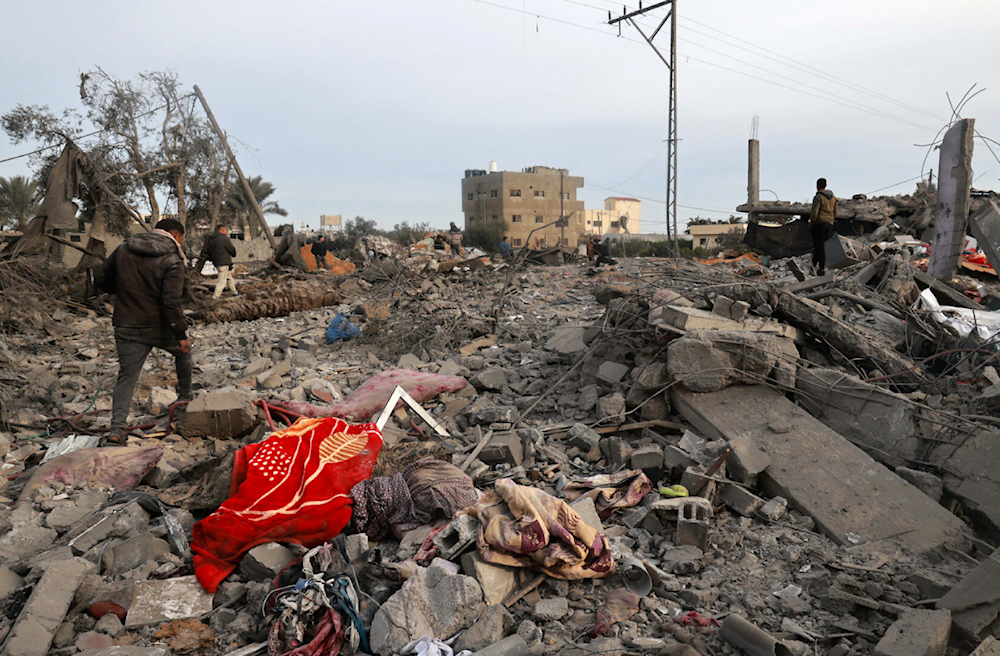Destruction in Gaza 'unprecedented': WHO spokesperson
Tarik Jasarevic tells Anadolu that the war has caused unparalleled levels of destruction, with 70 to 80% of civilian infrastructure destroyed or seriously damaged.
-

People check the destruction caused by overnight Israeli strikes in Rafah in the southern Gaza Strip on February 23, 2024. (AFP)
World Health Organization (WHO) spokesperson Tarik Jasarevic stated that the war on Gaza has inflicted "unprecedented destruction", Anadolu reported.
Speaking to Anadolu, Jasarevic said that the war has caused unparalleled levels of destruction, with 70 to 80% of civilian infrastructure, including houses, hospitals, schools, and water and sewage facilities, destroyed or seriously damaged.
Jasarevic stated that it will take decades to rehabilitate Gaza's infrastructure, especially the health sector, which is barely surviving.
Jasarevic pointed out that the United Nations Conference on Trade and Development predicts it will take tens of billions of dollars and decades to reverse the overall financial harm, including rebuilding the health system, which is "on its knees," further stating that “only 13 out of 36 hospitals are partially or minimally functioning in Gaza."
He cited a UN analysis that indicated that if the war immediately stopped, it would take until 2092 to restore Gaza's GDP levels in 2022.
He added that the WHO would continue its plans of supporting Gaza hospitals "with a financial ask for $110 million, with a strong focus on supporting existing health facilities, strengthening and maintaining health care services, managing casualties and reinstituting a trauma care pathway, as well as supporting medical evacuations and maintaining essential health services, working with international emergency medical teams and establishing additional field hospitals to cope with the acute needs.”
Meanwhile, Jens Laerke, the spokesperson for the UN Office for the Coordination of Humanitarian Affairs (OCHA), noted that the Office had constantly warned about the consequences of not providing adequate relief to Palestinians in Gaza, further warning that it was not only war that could be fatal but starvation and a public health crisis as well.
The United Nations warned Monday that an alarming lack of food, surging malnutrition, and the rampant spread of disease could spark an explosion in child deaths in Gaza.
Speaking to Anadolu, Laerke stated that they were trying their utmost to provide supplies and had been pushing for a ceasefire on humanitarian grounds for quite some time.
Seriously injured Palestinians left for dead: French doctors
A French Doctor who worked alongside local medical colleagues in the Gaza Strip for two weeks said that what he witnessed in the territory's medical sector cannot be compared to any other warzone.
Dr. Raphael Pittit works with the Union of Medical Care and Relief Organizations to train medical staff in war zones. He, alongside around 20 other doctors, worked with the Palestinian doctors' association Palmed, for two weeks, at the European Hospital in the southern Gaza Strip. Pittit was interviewed by Le Monde upon his exit from the Strip, and he described the situation at the hospital as "mayhem".
The doctor, who is an anesthetist-resuscitator and had previously worked in former Yugoslavia, Lebanon, the Gulf, Syria, and Ukraine, affirmed that none of the previous war zones he was positioned at can compare to the situation in the Gaza Strip.
Pittit stressed that the lack of medical equipment in the Gaza Strip has left the hospital non-operational.
"Sometimes the operations last for hours because we lack equipment. We lack painkillers (morphine, sedatives), the few we have are reserved for those we think will survive," he revealed.
"We have no other choice but to let the most seriously injured die without being able to relieve them because otherwise, they will take personnel, resources, beds, medicines... and that leaves less chance for [others]."
He explained that adding to the lack of medical equipment, the huge influx of Palestinian civilians forcibly displaced by Israeli forces to the hospitals further complicated the situation.
"It is a crowd locked in a narrow space, with no ability to move around, and has to search for food, water, toilets... and is subjected to violence," Pittit said about Palestinians in the Gaza Strip.
In a more recent interview conducted by Le Figaro, Pittit said, "Usually civilians can flee fighting. Here it is impossible. The population has no place to protect themselves. Hundreds of thousands of people are wandering the streets in search of water and food."
He also confirmed that the hospital he worked at did not receive any military casualties and only treated civilians.

 4 Min Read
4 Min Read








